![]()
Arbaeen march; a religious ceremony or a show of political power?
There are a few days left to the Arbaeen march – the biggest gathering of Shias held in Iraq with pilgrims from all over the world attending. This ceremony is held with a significant number of Iranian pilgrims and it has the full support of the Iranian establishment.
This year’s ceremony is held while there has been unrest and anti-government demonstrations in Baghdad and other cities of Iraq.
The government’s statistics show that this year a record number of Iranian pilgrims are going to take part in this ceremony. According to Iranian officials, more than 3 million people have registered to go to Karbala and take part in the Arbaeen march.
There is no doubt that for many of the participants in this ceremony, the pilgrimage to Karbala as well as their religious convictions are the main motivations behind their participation. Nevertheless, many experts hold that the ceremony is a big show of power for the Iranian establishment in the region and the Middle East.
Despite the fact that the history of Iran’s participation in this ceremony is less than a decade, the Arbaeen march is of great significance to the Iranian establishment. In spite of Iran’s economic crisis, the pressure imposed on it due to US sanctions, and a significant drop in its oil revenues, the government has made the necessary preparations to ensure the march is larger than those witnessed in previous years.
Some experts believe that this march costs the Islamic Republic millions of dollars each year. Because of the economic sanctions imposed on Iran and its national currency plummetting, this trip has become very expensive for Iranian pilgrims.
Now the question is: what is the Iranian establishment gain by holding this ceremony? For the Islamic Republic, the Arbaeen march has become a political move.
This year’s ceremony has coincided with unrest and anti-government protests, as well as harsh slogans raised against the Iranian government. Despite security concerns for the pilgrims, Iranian officials have unanimously called for holding the march, while explaining that the conditions in Iraq are normal.
For the Iranian establishment, the presence of millions of Iranian pilgrims is a show of power to its regional rivals, America, and Israel, at a time when the Middle East is sitting on a keg of gunpowder which might explode at any minute.
Independent Persian
The Iranian president and undeniable facts
The editorial of Arman Melli deals with the unaccountability of the Iranian President Hassan Rouhani and how he has ignored undeniable facts existing Iranian society.
Almost three years have passed of Hassan Rouhani’s second term. In his recent press conference, he said that there are no problems in society; the government has overcome societal crises and problems; there is a bright future ahead; some regional countries are making mischief, but they haven’t been able to prevent Iran’s progress.
However, Mr. Rouhani doesn’t talk about the 24 million people who voted for him and their demands. For Mr. Rouhani, there are no problems or issues in Iran’s foreign policy; Iran doesn’t have any tensions or differences with its neighboring countries; sanctions haven’t created any problems in Iran’s economy.
For Rouhani, there are no long queues of educated Iranians in front of Western embassies in Tehran wanting visas to leave Iran; there are no class differences; corruption doesn’t find new dimensions every day; journalists, writers, teachers, labor activists, and women who are fighting for their rights don’t have any problems; there are no environmental issues. To Mr. Rouhani, there is no problem at all. Mr. Rouhani thinks everything is all right. There is certain mischief done by Iran’s neighboring countries, which are provoked by “the enemy”, but the Iranian people will respond to them.
It is hard to imagine who those who give advice to Mr. Rouhani are. Is it his Chief of Staff Mahmoud Vaezi? Or is it his advisor Hesamoldin Ashena? If Rouhani thinks that by such ignorance, he can please the Iranian “hardliners” and “principlists”, he is wrong.
As such, Rouhani has lost his 24 million voters, the students, workers, teachers and “reformists”, and on the other hand, he has failed in pleasing the “hardliners”.
Arman Melli
Imran Khan’s positive step
The editorial of Etemad explains why Imran Khan’s efforts in mediating between Iran and Saudi Arabia must be taken seriously to resolve the disputes that exist between the two countries.
Imran Khan’s popularity within and without Pakistan makes it possible for him to be a successful mediator in the international domain. His speech in the United Nations indicated that he is a reliable, and peaceful person in the political domain, as well as having the capability to resolve regional disputes.
As such, there is hope that Imran Khan can create trust between Iran and Saudi Arabia – for which he travelled to Tehran. On the other hand, one must consider that Pakistan is one of the few countries in the region that has good relations with both Iran and Saudi Arabia.
However, under the current circumstances, what is going on in the political domain of Iran and Saudi Arabia? Do both countries have the will to resolve the disputes and challenges that exist between them?
There are signs that the initial will exists, and both the Iranian and Saudi Arabian sides have announced their readiness to hold negotiations. Therefore, Imran Khan’s trip can at least alleviate the disputes between the two and prevent unpredictable tensions.
The other important issue that must be mentioned is the kind of issues and problems that exist between Iran and Saudi Arabia. Both countries have different views over a wide range of issues – from Syria and Yemen to Iraq and political developments in Lebanon.
Resolving political and security issues are much more difficult than resolving problems in the fields of economy and trade. For years and decades, differences between the two countries have accrued. Naturally, Imran Khan cannot resolve all these issues by himself. But his mediation can prepare the ground for both countries to get closer in order to resolve their issues. There are signs that both sides are ready to solve the crisis in Yemen.
Etemad
Iranian women in the Azadi Stadium
The editorial of Arman Melli makes a few points about the first official presence of Iranian women in Azadi Stadium.
With regard to the presence of Iranian women in Azadi Stadium to watch a soccer match for the first time after the Islamic revolution, it seems that some officials including Masoumeh Ebtekar – Vice President of Iran for women and family affairs – and others are wanting to take the credit for this watershed moment. But the truth of the matter is that if credit is to go to anyione it should go to Sahar Khodayari – the Blue girl who committed suicide by setting fire to herself – and then to FIFA. Such a moment, cannot be accredited to Masoumeh Ebtekar, Iran’s sports minister or to the government’s spokesperson.
The truth is if it were not for Sahar Khodayari’s decision to go to the stadium and what happened after that, as well as for FIFA’s serious pressure on Iran in this regard, the sports minister would still be saying that they were trying to prepare the ground for women’s presence in stadiums.
The presence of women in the stadium has created social happiness among Iranian girls and women. Those who are against women’s presence in stadiums must say which part of it bothers them. So far, none of the opponents have offered any convincing reason in this regard.
They must explain what great problems or disasters were created when Iranian women and girls went to Azadi Stadium to watch the Iran-Cambodia match. The answer is very clear: nothing strange took place! On the contrary, one can argue that it had a very positive impact.
Women’s presence in stadiums, for example, can prevent some misbehavior and misconduct of men there. What is more, the presence of women and girls at sporting events can create joy and happiness.
Arman Melli
![]()
Khamenei puts emphasis on boosting the IRGC’s military and intelligence activities
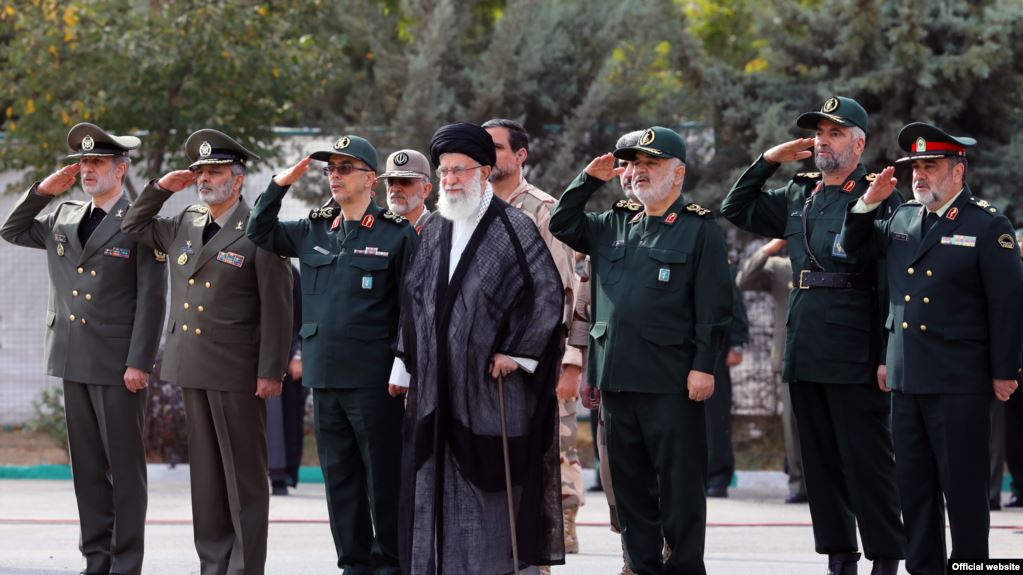
The Islamic Republic’s Supreme Leader Ali Khamenei has called for the IRGC’s military and intelligence activities to be boosted.
During a visit to the IRGC’s Officers Academy, Khamenei addressed the forces of this military institution, saying, “ W see what you need in all the military and intelligence fields.” He underlined that the IRGC’s military tools should be “up-to-date” and made in Iran.
“These tools must be made and invented with variety domestically,” Khamenei remarked, “and they should cover all the needs on the ground, in the air, space, sea, and along the borders.”
On a different note, Ali Khamenei pointed out that the “Iranian nation” considers confrontation with America and Israel as “a duty”, and would not give in to pressures from its enemies.
In early October, Khamenei had asked the IRGC commanders to be ready for confronting major events. “Do not be scared of the enemy at all,” he said, “but be vigilant and evaluate the enemy accurately.”
Meanwhile, Brian Hook, US Special Representative for Iran, testified in front of the US Senate Foreign Relations Committee, “If no measure is taken against Iran’s missile program, it is possible that we face a regional war.”
Hook added that the 40-year record shows that the Iranian regime gives in to negotiations under military threats or isolation. He added “Our basis is currently Iran’s diplomatic isolation and maximum pressure on this country.”
Radio Farda
Radio Farda
Rouhani delivers a speech at Tehran University while students hold protest assemblies
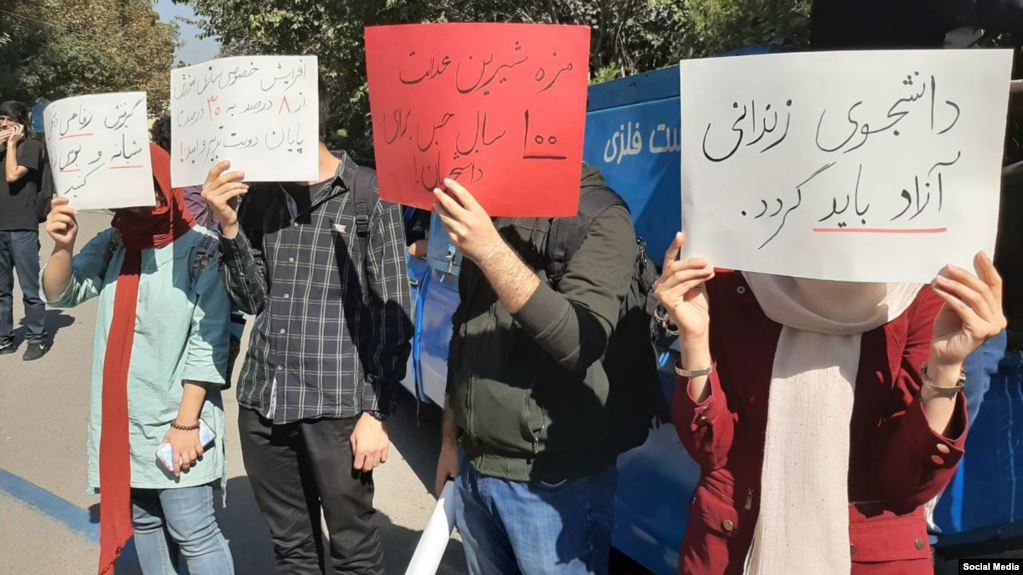
President Hassan Rouhani delivered a speech at Tehran University, marking the beginning of the academic year while students protested against jail sentences issued to students, discriminatory laws and hikes in tuition fees, among other issues.
Tehran University students said Hassan Rouhani’s presence at their university was “a show” and he had not fulfilled his campaign promises, including the lifting of a “security atmosphere” present on university campuses.
Rouhani, however, refused to say anything about imprisoned students or other topics of importance to students in his speech. He referred to US sanctions and said it is possible to live without interaction with the world, but it is not possible to progress. Rouhani noted that in the past 40 years there have been disagreements in the Islamic Republic’s establishment over whether to interact or confront the world. “We have argued for years without getting anywhere; we should hold a referendum and ask people what to do,” he asserted.
Iran’s president noted that people need to get ready to take part in the upcoming parliamentary elections. “There is no other way except for participating in elections,” said Rouhani, “I know this by experience.”
It should also be noted that some members of the Student Basij left in the middle of Rouhani’s speech to express their protest.
Radio Farda
A bill to eliminate English language teaching from Iranian schools
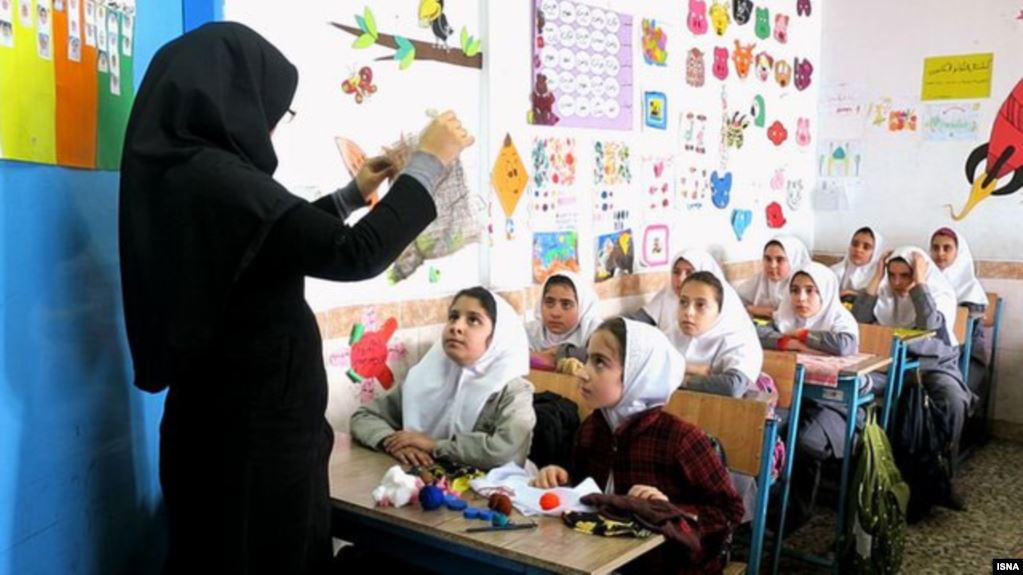
57 members of the Iranian parliament have drafted a bill according to which the English language will no longer be taught at public schools nationwide. The bill, if approved, will also ban the hiring of English language teachers at schools.
The bill says that the English language can merely be taught at private institutions under the supervision of the Ministry of Education. Some “principlist” lawmakers, including Javad Karimi Ghodusi and Mohammad Javad Abtahi, as well as a number of “reformist” MPs, such as Ahmad Mazani, are among the signatories of this bill.
Hassan Norouzi, Spokesperson of the Parliament’s Legal and Judiciary Commission, said in defense of the bill, “Since the beginning of the revolution, the majority of spies have spoken English. Today most of the scientists of the world are Turks, Arabs or Germans. Why shouldn’t we learn them [those languages]?”
In 2016, the Islamic Republic’s Supreme Leader Ali Khamenei criticized the promotion of the English language in Iran. He said that the English language was spreading “even in daycare centers nowadays.” Following his comments, the English language was banned at primary schools. It became limited to high schools only at the time.
Radio Farda
Deutche Welle
IMF: Iran’s economy to shrink 9.5% in 2019
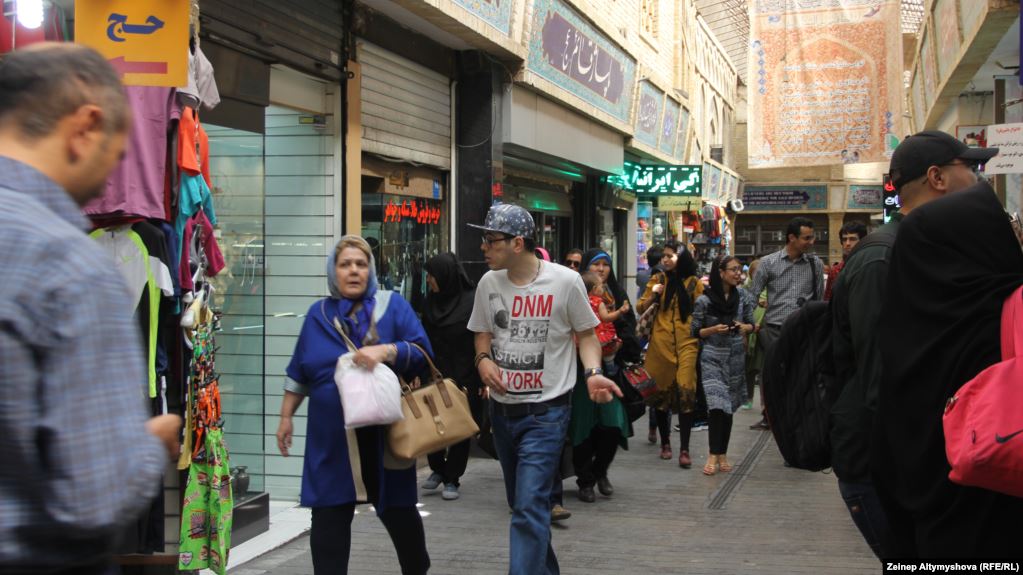
The International Monetary Fund (IMF) predicted in a report that Iran’s economic growth for 2019 will be – 9.5%. The report, that studies global economic prospects, says that Iran’s economic growth for 2018 was – 4.8%, and it will be negative for this year as well.
The IMF’s statistics show that Iran, after Venezuela, will have the lowest economic growth.
The IMF report is published a week after the World Bank had predicted that Iran’s economic growth will be – 8.7% for 2019.
The World Bank’s prediction was based on the assumption that Iran would export roughly 500,000 barrels of oil per day and would continue to do so. But the statistics of the tanker tracking company show that during the past months, Iran’s oil exports have dropped to less than 300,000 barrels per day. Iran’s oil exports are used to pay Iran’s debts to Chinese companies for developing the Azadegan and Yadavaran oil fields; while a part of the oil exports are sent to Syria.
It is not clear if Syria pays Iran for the oil it receives.
The IMF has forecasted the rate of inflation in Iran for 2019 at 37.5%, the World Bank’s estimate is more pessimistic, forecasting the rate of inflation in Iran at 38.3%.
The IMF says that after Venezuela and Sudan, Iran has the highest rate of inflation in the world.
Radio Farda
The Export of 70 million tons of non-oil goods from Iran
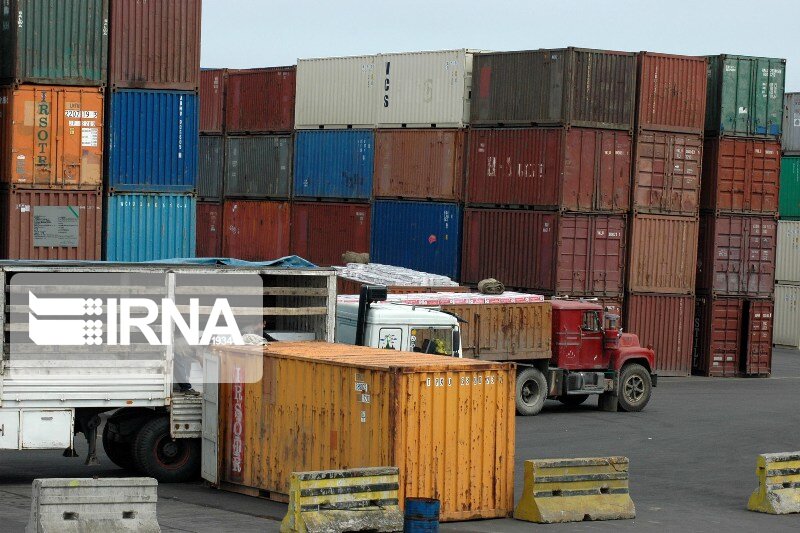
The Head of Iran’s Customs announced that Iran’s export of non-oil goods reached 70 million tons, worth $2.9 billion, in the past six months. According to Mehdi Mirashrafi, this shows a 22% increase compared to the same period last year.
He said 16 million tons of goods, worth $21.3 billion, were imported in the past six months. 10 million tons of imported goods were essential goods, and 6 million tons included raw materials and machinery needed for the production line.
Mirashrafi added that despite “America’s economic terrorism, we have been able to keep this level of exports”.
IRNA
2,808,000 drug addicts in Iran
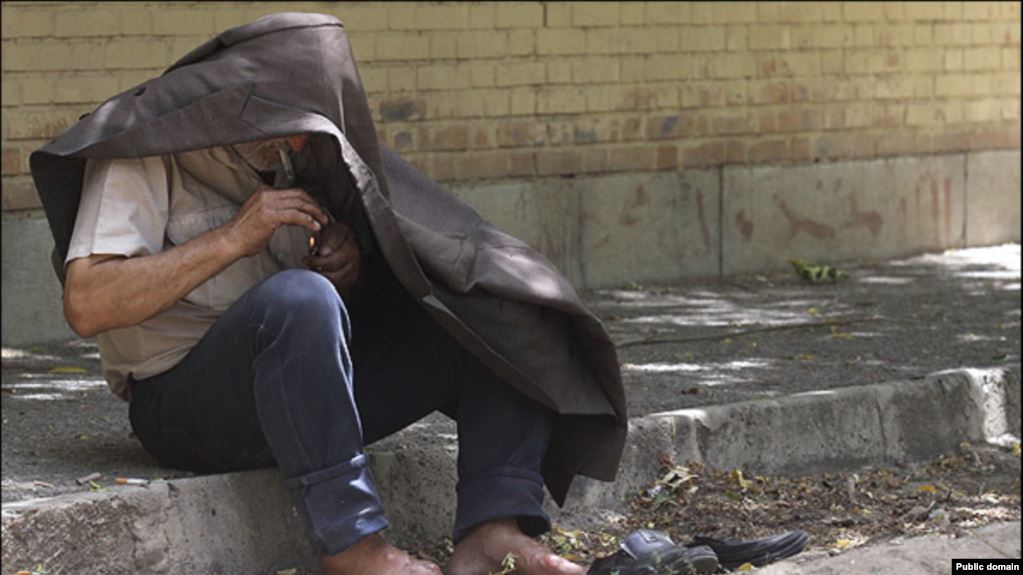
Iran’s official at the Drug Control Headquarters has estimated that there are more than 2.8 million drug addicts in Iran, adding that the consumption of drugs has increased during the past three months.
Nasser Aslani asserted that after the Islamic Revolution, the use of drugs decreased in the country from 1979 to 1987, but after 1987, the use of drugs has been on the rise.
According to Aslani, there are 2,808,000 addicts who use drugs on a regular basis, while 600,000 people use drugs just for fun.
According to the statistics of the United Nations Office on Drugs and Crime, Iran is one of the biggest highways for drug trafficking, along with Central Asia, Pakistan, and India. A large amount of narcotics is seized from these regions each year.
Radio Farda
